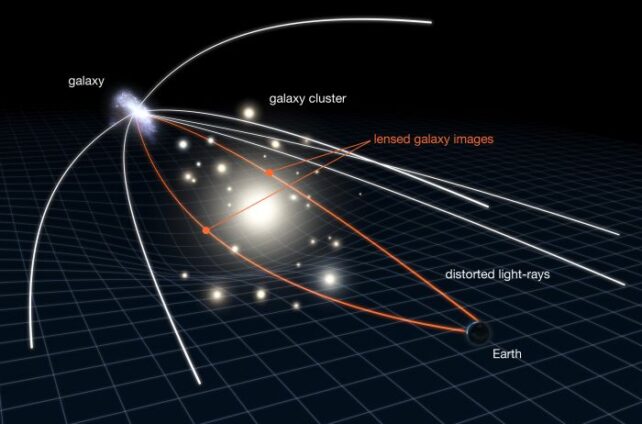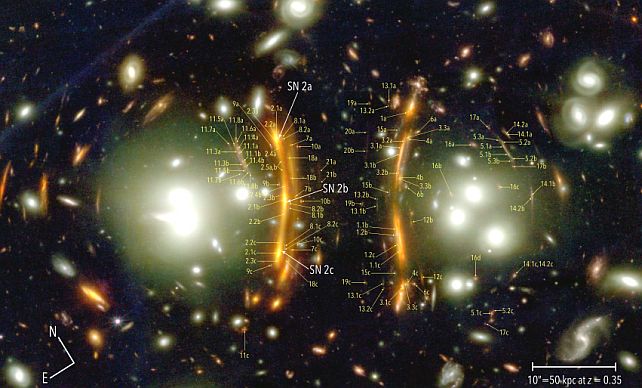
[ad_1]
The sunshine of a supernova that has traveled for 10 billion years to achieve us has given us a brand new measurement of the Hubble fixed – the accelerating charge at which the Universe is increasing.
Known as SN H0pe, it is one of the vital distant Sort Ia supernovae we have ever seen, and measurements of the speed at which it appears to be receding have given a Hubble fixed of 75.4 kilometers per second per megaparsec.
This leaves us in a dilly of a pickle. Measures of the early Universe based mostly on a distinct technique known as a ‘normal ruler’ are likely to return slower outcomes of round 67 kilometers per second per megaparsec.
Whereas SN H0pe seems because it did a complete 4 billion years after the Large Bang, it is a lot additional again in time than different ‘normal candle‘ measurements taken within the close by Universe, that are round 73 kilometers per second per megaparsec – suggesting that the strain is constant all through the seen Universe, so far as we are able to see.
This takes one attainable clarification for the strain off the desk: that native house is receding at a better charge than distant house. If one method will get the identical outcomes for each the distant and native Universe, that implies that H0 is kind of uniform.
frameborder=”0″ permit=”accelerometer; autoplay; clipboard-write; encrypted-media; gyroscope; picture-in-picture; web-share” referrerpolicy=”strict-origin-when-cross-origin” allowfullscreen>
OK, we are able to clarify. The entire downside is that this factor referred to as the Hubble rigidity – an unresolved discrepancy between the outcomes of various strategies used to measure the accelerating enlargement of the Universe.
The usual ruler method makes use of relics of the early Universe. These are issues just like the cosmic microwave background, or fossilized densities within the distribution of galaxies referred to as baryon acoustic oscillations.
Normal candles, then again, are objects of identified intrinsic brightness, reminiscent of Cepheid variable stars, and Sort Ia supernovae. Since these objects are presumed to emit a comparatively constant quantity of sunshine, we are able to work out how far-off they’re by measuring their obvious brightness.
However their usefulness is restricted by their distance – sooner or later, they develop into too far-off to see, in order that they’re usually solely used to measure the Hubble fixed within the native Universe.
H0pe is loads farther than most Sort Ia supernovae we are able to see. That is as a result of it is magnified and triplicated by a quirk of space-time generally known as a gravitational lens.
Round a large object, reminiscent of a galaxy or galaxy cluster, space-time tends to curve; any mild touring by means of this curvature may be repeated and magnified, very similar to curved glass magnifies no matter is behind it.

H0pe, as we defined final yr when the invention was made, sits behind a galaxy cluster. As the sunshine from the supernova traveled by means of the gravitational lens generated by the cluster, it magnified and cut up into three distinct dots.
“That is just like how a trifold self-importance mirror presents three completely different photographs of an individual sitting in entrance of it. Within the Webb picture, this was demonstrated proper earlier than our eyes in that the center picture was flipped relative to the opposite two photographs, a ‘lensing’ impact predicted by idea,” says cosmologist Brenda Frye of the College of Arizona.
“To attain three photographs, the sunshine traveled alongside three completely different paths. Since every path had a distinct size, and light-weight traveled on the similar pace, the supernova was imaged on this Webb remark at three completely different occasions throughout its explosion.
“Within the trifold mirror analogy, a time-delay ensued during which the right-hand mirror depicted an individual lifting a comb, the left-hand mirror confirmed hair being combed, and the center mirror displayed the individual placing down the comb.”

This allowed the researchers to make an in depth measurement of the Hubble fixed within the distant Universe utilizing an ordinary candle method often solely utilized to the native Universe. The results of 75.4 kilometers per second per megaparsec could not resolve the strain, nevertheless it does slender down what the reason is perhaps.
The Hubble rigidity is likely one of the largest issues in cosmology. It isn’t remotely trivial: it is going to inform us how massive and previous the Universe is, and provides us extra correct measurements throughout space-time as a complete.
Astronomers typically use a Hubble fixed of round 70 kilometers per second per megaparsec to find out distances to cosmic objects – which is simply an estimate based mostly on one of the best information we at present have.
Resolving the Hubble rigidity will possible be a Nobel-winning achievement. And the excellent news is that we appear to be getting nearer.
Gravitational waves have given us a brand new device to try to slender it down – the usual siren. Normal siren measurements have been made; they’re within the neighborhood of each normal rulers and normal candles, so nonetheless inconclusive, nevertheless it’s solely a matter of time now.
And some extra observations from the JWST might get us there. With simply 4 extra occasions like H0pe, the boldness degree of the measurement might be improved to over three sigma. That shall be an excellent day.
The report of the brand new measurement has been submitted to The Astrophysical Journal, and is obtainable on preprint server arXiv.
[ad_2]